Reducing Elution Volumes with High Capacity and Improved Mass Transfer Ion Exchange Resins
July 1, 2008

Figure 1.
At recent scientific conferences on downstream processing, there was much discussion about the need to reduce process volumes. Many manufacturing sites are space-limited and to take advantage of chromatographic process improvements, they must be made without the need to increase buffer and holding tankage.
One significant opportunity to increase process throughput is to replace conventional with higher capacity ion exchange resins. Recently developed high capacity resins allow more protein to be loaded without the need to replace existing column hardware for larger column dimensions. To keep pace with increasing titers of feedstock, using higher capacity resins results in process improvements while utilizing existing chromatography hardware.
This article demonstrates that an even better solution is available in the form of new Toyopearl GigaCap resins (specifically designed for packed bed use) which have both high capacity and improved elution kinetics. When combined together and depending on your existing chromatography resins, these benefits may significantly reduce target pool volumes by, as will be shown, as much as 75% or more.
Toyopearl Giga Cap Ion Exchange Resins
Over the past year Tosoh Bioscience has introduced three new ion exchange products, which together form the next generation series of high capacity, polymeric ion exchange resins for the purification of mAbs and other proteins.
The Toyopearl GigaCap series consists of three high capacity resins:
Toyopearl GigaCap S-650M
Toyopearl GigaCap CM-650M
Toyopearl GigaCap Q-650M
Each of the above resins exhibits high individual dynamic binding capacities (Table 1) and each can be used at high linear flow velocities up to a pressure of 3 bar for improved process throughput. In addition, data in Figures 1, 2, and 3 show that protein are eluted in significantly lower pool volume, and thus, can be collected as more concentrated target, when compared with other high capacity resins. (Please note that, as of this writing, no comparable high capacity weak cation exchange resins were available to compare breakthrough curves.)
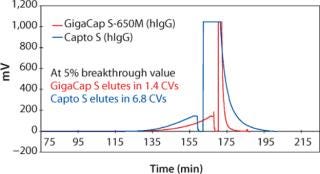
Figure 1. ()
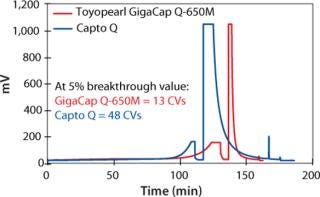
Figure 2. ()
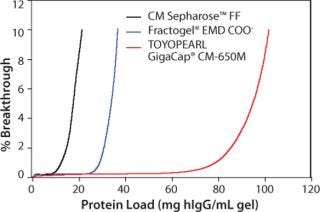
Figure 3. ()
Table 1. Basic properties of Toyopearl GigaCap resins
Toyopearl Giga Cap Base Beads
Unmodified Toyopearl HW-65C resin was utilized as the base bead for the new Toyopearl GigaCap resins. The average particle size of 75µm provides for enhanced efficiency and higher resolution than other larger particle size materials, while improved pressure-flow properties are obtained over smaller particle size materials. (The particle size range nomenclature for Toyopearl HW-type SEC resins is slightly different than that which is used for the Toyopearl functionalized IEC resins. Toyopearl HW-65C has a particle size range of 50–100µm which is between the normal Toyopearl IEC “C”-grade (50–150µm) and “M” grade (40–90µm). Toyopearl GigaCap product names ending in “M” are the 50–100µm bead.)
Toyopearl Giga Cap Ligand Attachment Chemistry
A polymer bead contains a distribution of small to large pores to which the ligand is normally attached relatively uniformly. The new Toyopearl GigaCap ligand attachment chemistry results in preferential placement of the functional groups in the larger more protein-accessible pores promoting both higher protein dynamic binding capacities and improved resin binding and desorption. The actual chemistry to obtain these high capacity ion exchange resins is considered proprietary to Tosoh Corporation, Tokyo, Japan. The basic properties of the Toyopearl GigaCap resins are listed in Table 1.
Toyopearl Giga Cap S-650M (Strong Cation Exchange Resin)
Toyopearl GigaCap S-650M resin was specifically developed for the purification of monoclonal antibodies. As other Toyopearl GigaCap resins, Toyopearl GigaCap S-650M resin has excellent kinetics (Figure 1) and maintains reasonably high capacities at higher linear velocities (Figure 4). The slightly larger particle size (50–100µm) has been optimized to give a unique combination of improved pressure-flow characteristics (Figure 5) with excellent resolution at high loads (Figure 6). In separate studies it was established that DBC-values for smaller proteins such as insulin and lysozyme were also impressive with typical values of 133mg/mL and 167mg/mL respectively.
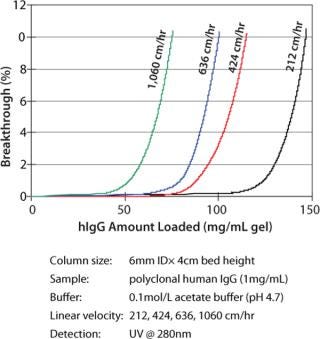
Figure 4. ()
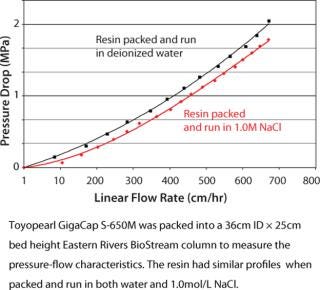
Figure 5. ()
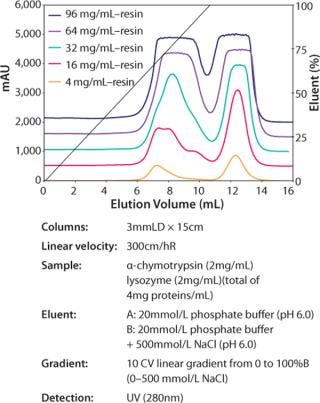
Figure 6. ()
Toyopearl Giga Cap CM-650M (Weak Cation Exchange Resin)
Toyopearl GigaCap CM-650M resin was designed for the purification of monoclonal antibodies that require a different chromatographic selectivity than is available with Toyopearl GigaCap S-650M resin (Figure 7). Excellent kinetic properties and high capacity are maintained at high linear flow velocities. Since GigaCap CM-650M resin is based on the same particle size base-beads as the other members of the Toyopearl GigaCap series, very good pressure-flow properties are obtained for this resin as well (Figure 8).
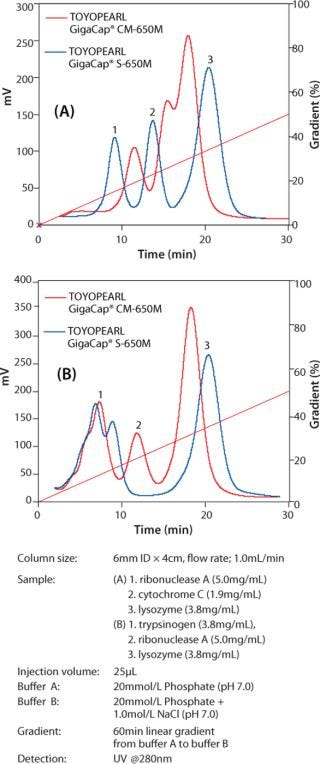
Figure 7. ()
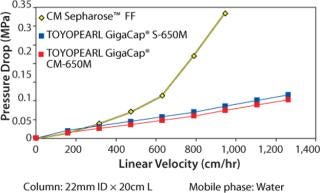
Figure 8. ()
Toyopearl Giga Cap Q-650M (Strong Anion Exchange Resin)
Toyopearl GigaCap Q-650M resin is the high capacity anion exchange resin in the Toyopearl GigaCap line of process chromatography resins. It was primarily designed for the capture and purification of proteins, although it can also be used for mAb polishing in negative or flow-through chromatography mode. Of particular note is the excellent capacity of Toyopearl GigaCap Q-650M for such large proteins as thyroglobulin (Figure 9).
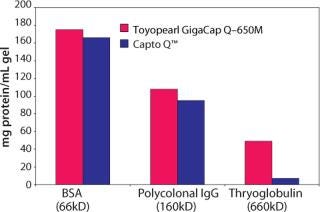
Figure 9. ()
Conclusion
Over the past year Tosoh Bioscience has introduced three Toyopearl GigaCap ion exchange resins, each offering high capacity at high linear velocities and a substantial reduction of target desorption volumes. These new products have the potential to improve process throughput even at manufacturing sites that have limited options to increased tankage.
You May Also Like





